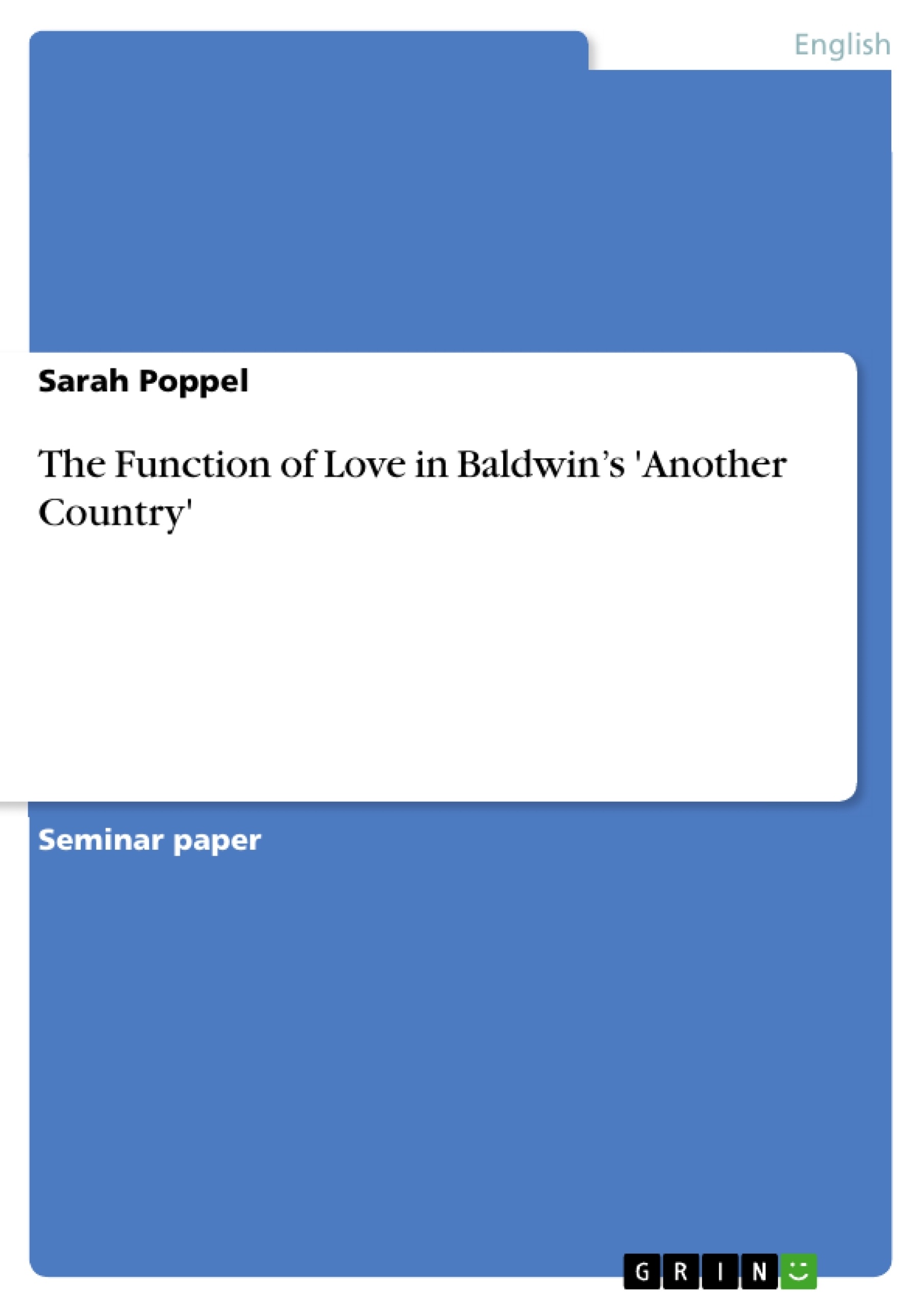The novel Another Country, published in 1962, was written by James Baldwin, an African-American writer, particularly well known for his social-critical essays. Another Country, as a fictional work, serves Baldwin to express several ideas formerly developed in his essay writing and so the novel covers a manifold spectrum of social issues, including race, sexuality and finally love. Love as a central topic in Baldwin’s Another Country has been analysed by several critics and even Baldwin admits candidly that the novel shows “the desperate searches” of its characters “for the self- knowledge and self-esteem – the identity – without which real love is impossible.” But how do these themes work in the novel, what does such a love have to look like and what does it have to include for the individual to be “able to learn to see real human beings behind the categories, labels, and prejudices” which are imposed by the loveless in a society. This essay undertakes an approximation to these questions mainly on the basis of the novel, considering some of Baldwins essays and works of critics such as Lorelei Cederstorm or David Leeming.
The first part will focus on an analysis of the relationship with which the novel starts and which can be regarded as a crucial guideline, a “negative touchstone” for the further development and interpretation of the novel. In Part II a short overview of the other relationships of the novel is provided. By doing this, their connection with the first relationship will be illustrated, until finally it will be posible to suggest how the characters succeed or fail in the matter of love, which Baldwin conceives as “[…] a journey two people have to make with each other.”
Table of Contents
- Introduction
- Part I: How the lack of love leads to madness and death.
- Some stylistic and textual aspects
- Analysis: Rufus and Leona
- Conclusion Part I
- Part II: Prospect for the other characters and their journey to Another Country.
- Cass and Richard – Eric and Yves - Vivaldo and Ida
- The journey to Another Country and Conclusion
Objectives and Key Themes
This essay aims to explore the complex themes of love, race, and identity in James Baldwin’s novel *Another Country*. The essay focuses on the significance of love in the novel, analyzing how it impacts the characters' journeys and the social context surrounding them.- The destructive nature of love in a society characterized by racial prejudice and inequality.
- The importance of self-knowledge and self-esteem as prerequisites for authentic love.
- The diverse forms of love portrayed in the novel, encompassing romantic, familial, and platonic relationships.
- The role of societal pressures and personal histories in shaping characters' experiences with love.
- The challenges of achieving true connection in a world marked by social divisions and internalized prejudice.
Chapter Summaries
The first part of the essay examines the relationship between Rufus, a Black jazz musician, and Leona, a White Southern woman. Their relationship is characterized by violence and a lack of genuine love, ultimately leading to Leona's mental breakdown and Rufus' suicide. The first chapter also introduces the other major characters, including Vivaldo, Ida, Cass, Richard, and Eric. The second part of the essay explores the relationships of the other characters, highlighting their connections to Rufus and Leona. The essay examines how these characters' journeys are influenced by their own experiences with love, race, and society.Keywords
The key themes and concepts explored in this essay include love, race, identity, societal pressures, self-knowledge, self-esteem, interpersonal relationships, and the complexities of human connection.- Quote paper
- Sarah Poppel (Author), 2004, The Function of Love in Baldwin’s 'Another Country', Munich, GRIN Verlag, https://www.grin.com/document/127795



